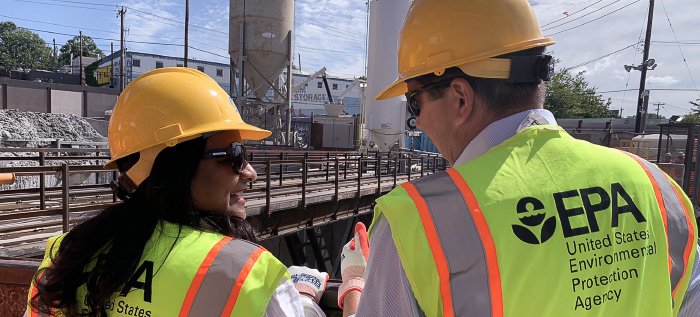Epa Careers

Embarking on a Fulfilling EPA Career: Opportunities, Requirements, and Growth Prospects
The United States Environmental Protection Agency (EPA) is a federal agency responsible for protecting human health and the environment. With a wide range of responsibilities, including enforcing environmental laws, regulating pollutants, and promoting sustainability, the EPA offers a diverse array of career opportunities for individuals passionate about environmental protection. In this article, we will delve into the world of EPA careers, exploring the various job roles, requirements, and growth prospects, as well as providing valuable insights and tips for those seeking to embark on a fulfilling EPA career.
Types of EPA Careers

The EPA employs individuals from various backgrounds and disciplines, including science, technology, engineering, and mathematics (STEM), as well as law, policy, and communications. Some of the most common EPA careers include:
- Environmental Scientists and Specialists: These professionals work on developing and implementing environmental policies, conducting research, and analyzing data to understand and mitigate the impact of human activities on the environment.
- Environmental Engineers: EPA environmental engineers design and implement solutions to environmental problems, such as developing systems to reduce pollution and promote sustainability.
- Law Enforcement and Criminal Investigators: These professionals enforce environmental laws and regulations, investigating and prosecuting individuals and organizations that violate environmental laws.
- Policy Analysts: EPA policy analysts develop and analyze environmental policies, working with stakeholders to promote sustainable development and environmental protection.
- Communications and Public Affairs Specialists: These professionals work on educating the public about environmental issues, developing outreach programs, and promoting EPA initiatives.
Requirements for EPA Careers
To pursue a career with the EPA, individuals typically need to meet specific requirements, including:
- Education: A bachelor’s degree in a relevant field, such as environmental science, engineering, or law, is often required for EPA careers.
- Experience: Many EPA careers require relevant work experience, which can be gained through internships, fellowships, or volunteer work.
- Skills: EPA professionals need to possess strong analytical, communication, and problem-solving skills, as well as the ability to work effectively in teams.
- Security Clearance: Some EPA careers may require a security clearance, which involves a background investigation and adherence to specific security protocols.
EPA Career Paths and Salary Ranges

The EPA offers a range of career paths, each with its own salary range and growth prospects. Some of the most common EPA career paths and salary ranges include:
| Job Title | Salary Range | Job Description |
|---|---|---|
| Environmental Scientist | $61,800 – $145,000 | Develops and implements environmental policies, conducts research, and analyzes data. |
| Environmental Engineer | $73,800 – $160,000 | Designs and implements solutions to environmental problems, such as developing systems to reduce pollution. |
| Law Enforcement and Criminal Investigator | $53,300 – $138,000 | Enforces environmental laws and regulations, investigates and prosecutes individuals and organizations that violate environmental laws. |
| Policy Analyst | $63,800 – $145,000 | Develops and analyzes environmental policies, works with stakeholders to promote sustainable development and environmental protection. |
| Communications and Public Affairs Specialist | $51,300 – $123,000 | Works on educating the public about environmental issues, develops outreach programs, and promotes EPA initiatives. |
Growth Prospects and Job Outlook
The job outlook for EPA careers is generally positive, with the Bureau of Labor Statistics (BLS) predicting growth in employment opportunities for environmental scientists, engineers, and specialists. The BLS also reports that the median annual salary for environmental scientists and specialists was $76,530 in May 2020, with the top 10% earning more than $129,450.
In addition to job growth and salary prospects, EPA careers offer a range of benefits, including:
- Job Security: EPA careers are generally considered to be stable and secure, with opportunities for advancement and professional growth.
- Work-Life Balance: Many EPA careers offer flexible work arrangements, including telework options and compressed work schedules.
- Professional Development: The EPA provides opportunities for professional development, including training, mentorship, and education assistance.
- Sense of Purpose: EPA careers offer a sense of purpose and fulfillment, as professionals work to protect human health and the environment.
How to Apply for EPA Careers

To apply for EPA careers, individuals can follow these steps:
- Search for Job Openings: Visit the EPA’s website to search for job openings, using keywords such as “environmental scientist” or “policy analyst” to find relevant positions.
- Review Job Announcements: Carefully review job announcements to ensure that you meet the requirements and qualifications for the position.
- Submit Your Application: Submit your application, including your resume, cover letter, and any required supporting documents.
- Prepare for Interviews: Prepare for interviews by researching the EPA and the position, practicing your responses to common interview questions, and preparing any materials you may need, such as references or writing samples.
Tips for Success in EPA Careers
To succeed in EPA careers, individuals should:
- Stay Up-to-Date with Industry Developments: Stay current with the latest developments in environmental science, policy, and law, attending conferences, workshops, and training sessions to enhance your knowledge and skills.
- Build a Strong Network: Build a strong network of professionals in your field, attending industry events, joining professional organizations, and participating in online forums and discussions.
- Develop Strong Communication Skills: Develop strong communication skills, including writing, speaking, and presentation skills, to effectively convey complex environmental information to various audiences.
- Pursue Continuing Education and Training: Pursue continuing education and training opportunities to enhance your knowledge and skills, staying current with the latest developments in environmental science, policy, and law.
Conclusion
In conclusion, EPA careers offer a range of opportunities for individuals passionate about environmental protection. With a diverse array of job roles, requirements, and growth prospects, EPA careers can provide a sense of purpose and fulfillment, as well as job security, work-life balance, and professional development opportunities. By understanding the types of EPA careers, requirements, and growth prospects, individuals can make informed decisions about their career paths and take the first steps towards a fulfilling EPA career.
Remember to stay up-to-date with industry developments, build a strong network, develop strong communication skills, and pursue continuing education and training opportunities to succeed in EPA careers. With the right skills, knowledge, and experience, you can embark on a rewarding and challenging EPA career, making a positive impact on the environment and human health.








